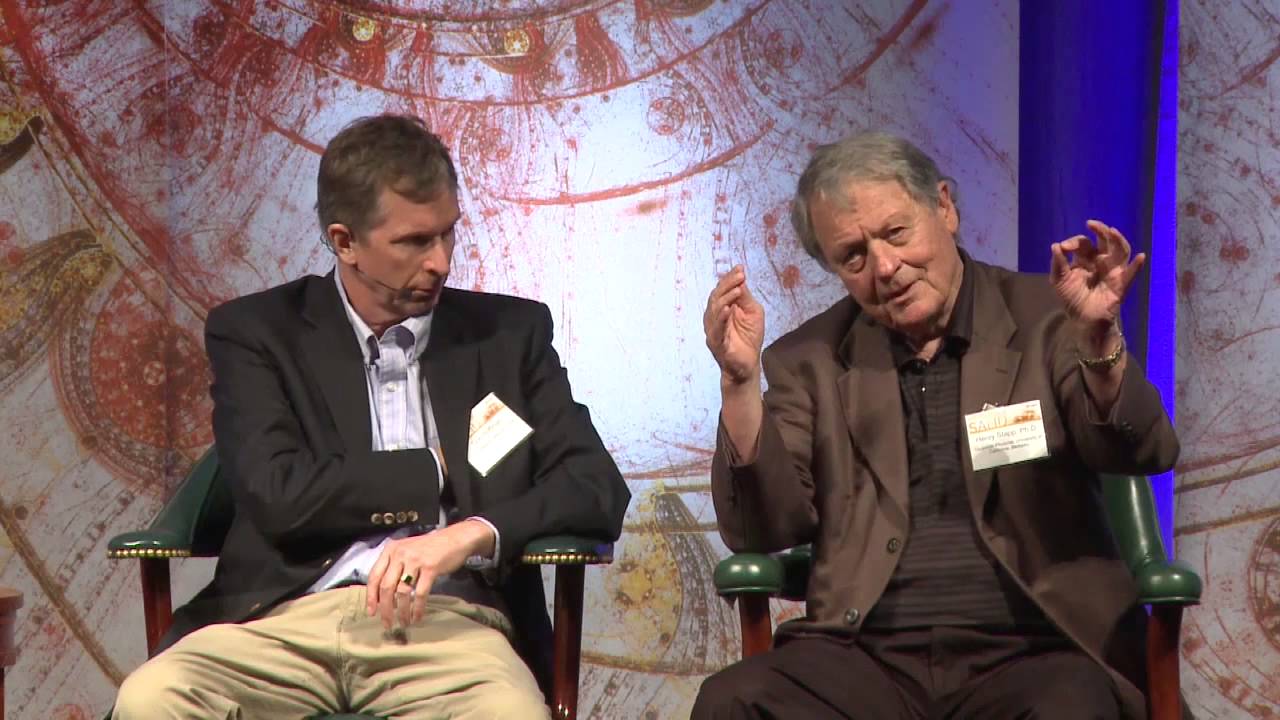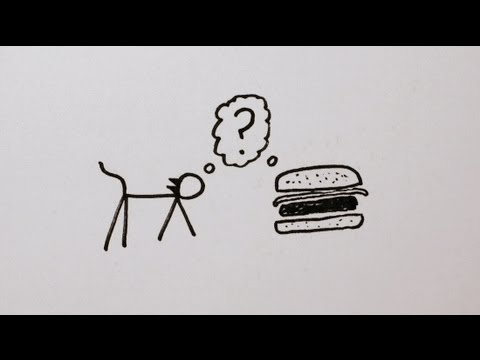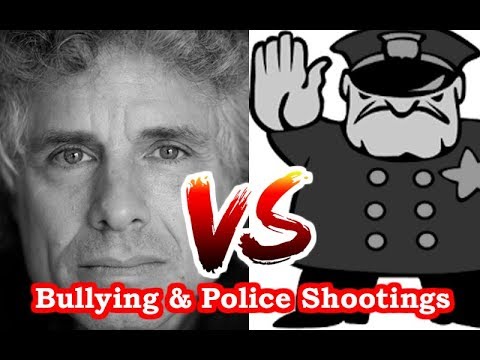scienceandnonduality
Quantum theory incorporates two seemingly-contradictory ideas about free will. On the one hand, an observer can choose both the system to measure and the kind of measurement to make; given these choices, the theory predicts a probability distribution over the
possible outcomes and nothing more. is is “quantum indeterminism.” On the other hand, a system that no one is looking at evolves through time according the dynamics that are perfectly deterministic. No one is “looking at” the universe as a whole – all observers are inside the universe by definition – so the time evolution of the whole universe must be perfectly deterministic. This clash between indeterminism and determinism is sharpened by the existence of a strong theorem, the Conway-Kochen “free will theorem,” that says that if human (or any other kind of) observers are assumed to have free will, everything
else in the universe, even electrons, has to be assumed to have free will, too. Is this conflict real, or might it dissolve on further analysis? This panel will examine some of the strikingly different views advanced by physicists on this question, illuminating the concept and role of entanglement in the process.”
Dr. Chris Fields is an independent scientist interested in both the physics and the cognitive neuroscience underlying the human perception of objects as spatially and temporally bounded entities. His particular interests include quantum information theory and quantum computing on the one hand, and creative problem solving, early childhood development and autism-spectrum conditions on the other. His recent papers have appeared in the International Journal of Theoretical Physics, Information, International Journal of General Systems, Advances in Cognitive Psychology, Frontiers in Perception Science and Medical Hypotheses among others. He is currently editing a Research Topic titled “How humans recognize objects: Segmentation, categorization and individual identification” for Frontiers in Perception Science.
Donald Hoffman is a cognitive scientist and author of more than 90 scientific papers and three books, including Visual Intelligence: How We Create What We See (W.W. Norton, 2000). He received his BA from UCLA in Quantitative Psychology and his Ph.D. from MIT in Computational Psychology. He joined the faculty of UC Irvine in 1983, where he is now a full professor in the departments of cognitive science, computer science and philosophy. He received a Distinguished Scientific Award of the American Psychological Association for early career research into visual perception, and the Troland Research Award of the US National Academy of Sciences for his research on the relationship of consciousness and the physical world.
Henry Stapp received his Ph.D. in particle physics at the University of California, Berkeley, under the supervision of Nobel Laureates Emilio Segrè and Owen Chamberlain. Wolfgang Pauli visited Berkeley in the spring of 1958. He talked extensively with Stapp, and invited him to work with him in Zurich in the Fall. Stapp worked in Zurich with Pauli on fundamental problems until Pauli sudden unexpected death in December. In 1970 Werner Heisenberg invited Stapp to Munich, where the two conversed often on fundamental issues surrounding quantum mechanics. After returning to Berkeley wrote an influential article The Copenhagen Interpretation, published in the American Journal of Physics with Heisenberg’s comments appearing in an Appendix. Stapp has has made major contributions to analytic S-matrix theory, generalizations of Bell’s theorems, and understanding the quantum connection of mind to physical processes.
Source




Some of you might enjoy my song about free will/determinism 🙂 https://youtu.be/rlJ6jNFAR7c
Its a shame there was not a single response to Hoffman's presentation while he alone brought something constructive to this panel. Seems like we prefer rumbling about instead.
Once we figure out what free will means,
then we can get to work on figuring out whether or not we have it.
If we don't have it, how did we ever get the idea that we do?
My favourite quote on free will is from Willard Van Orman Quine – We are free to will, but the will is not free to will as it will.
https://youtu.be/KEFh98LtSag
If science and philosophy committed the Ad Populum fallacy and only work within the current paradigm, new models and theories would never emerge. We'd still be stuck in Plato's cave if not for scientists who dare to challenge current models by looking through Galileo's lens .
It's a damn shame some want to keep science from exploring new ideas.
A big thank you to SAND for sharing the latest research and fresh minds.
huge uncertainty in henery's talk, idea or ideal, and oh by the way, and while were answering future questions, what?
Consciousness is all-pervasive, unitary. There is no splitting of consciousness, just because left and right hemispheres of the brain lose connection. Just as two people make different choices, yet exist within the same underlying consciousness, split-brain exists in one consciousness, making "different" choices. It just shows all intellect is capable of doing is categorize, divide, measure the material world around it, to level of abstraction, to deal with the world, without consuming too much of meager brain resources. That's why spiritual traditions of the East insist on transcending the limitations of sensory perceptions and the intellect to experience the unitive consciousness, or in Vedantic terms, the Brahman. Brain helps us to survive the physical world, so it must divide the world to discern threats and opportunities; therefore, it is incapable of seeing unity of all things. Transcendence happens in a different dimension, the one, intellect can only point to, but not beyond that.
What will happen in the future when humans spend most of their time in virtual reality and have full time virtual sex partners. Will the new virtual world be the downfall of the human race, or will it just be evolutionary progress since we are already living in a matrix?
We are biologically determined by DNA out of our control
Reality: we are born into a world already determined by laws of both nature and the universe we have no control over
Consciousness and the quantum is where things gets tricky
Could it be uncertainty here?
But this still doesn't prove we have free will
In context to Donald Hoffman I wonder if the split brain duality is the primary nature of indecision, and why we say one thing and act out another. I've been studying personal development for several years and this new research brings to light one of the most perplexing challenges for personal change.
How could anything in the universe have free will if:
1- It's always governed by the laws of physics / chemistry.
2- It's pre-determined by earlier events which make certain probabilities much more probable to happen.
the microphone are way way to sensitive. can hear one guys nose whistling constantly, then another's lips slapping together after every sentence, couldn't even listen to what's being said because every noise from breathing and lips slapping together where so damn annoying!!!!
what about about freewill being determined by an error correcting environment in non deterministic space of which you play a role. How could error correction occur in such a deterministically hostile environment as for this plane and you in it to exist without a god well how could an environment harbor a god at all well the answer is complex but yes error correcting systems can naturally emerge from such an environment however this goes against the second law of thermo dynamics which must be wrong or some super natural god is making it so. In other words order must emerge from chaos and vise versa it can't all just go to chaos or the universe would have never been.
The lawful regularities of our physical reality are emergent.
There is what I will call the intentianal field of implicate order. This is a social field and has an influence on freewill. Also, the choice you make now will influence the degrees of freedom for all future choices.
So what about pilot-wave theory, super-liquidity of vacuum, path memory and how new research is more and more bringing us closer to David Bohm's original theories that seemed to point toward determinism rather than the unknown or unknowable, observer-induced probability wave function collapse that most standard, orthodox quantum theorists have held since the days Copenhagen? Doesn't this at least strongly indicate that in terms of quantum reality there may be at least one (if not more) better, more elegant and well-supported theory of determinism that may shoot down – or at least bring into serious question – the assertion that particles don't have actual physical mass, velocity or position but only smeared clouds of probability distributions that are collapsed by us (or by any other "observer" or "measurer") ??? I think that this pilot-wave theory and its various ramifications is going to change the paradigm for how we look at what is behind (or beneath) quantum mechanics as we currently understand it. https://www.quora.com/Why-dont-more-physicists-subscribe-to-pilot-wave-theory. I've always leaned toward the mystical, random, unpredictable indeterministic view of reality that so many quantum theorists and philosophers have propounded, but this could be a game changer.
No contradiction. Determinism (superdeterminism) does not allow true probability.Can no one imagine expectation fulfillment? Are you kidding?
This was so rambling, and difficult to listen to … the lateralisation was interesting (heard it all before, as i studied Psych), but not really on topic (Quantum Theory?!). Waste of time.
Biological robots in the greater Cosmos, aware of very little. In control of not even your own heart beat. The universe birthing into itself an allusion.The Sunstars are networks of nursaries, common to Galaxies. You are as old as the universe, be that, to attain free will.
NOTES ON THE WILL:
1) As an innate property of mind-consciousness, the will is the determination or the intent of the inborn sentience in the living being to act in a specific manner and in no other.
2) To begin with, the will-impulse arises from the melange of thoughts, memories, instincts, hunches, experiences, emotions, sights, sounds, desires and other sentient inputs stored in the subliminal (or subconscious) aspect of the mind-consciousness and it then draws on the interactions with the current environmental factors and personality features of the individual to make a choice in a given situation.
3) As a result, once the will-impulse to act in a particular way, based on the above, is formed in these subliminal/subconscious depths then it rises to the surface mind where the human subject now takes note of it and attempts to realise it to the best of his/her capacity.
QUESTIONS ON THE WILL:
1) What is the will in terms of electrochemical reactions ?
2) Can the will be detected, isolated, quantified, transplanted and stored?
3) Can the will be created from scratch using electrochemical methods?
QUESTIONS ON THE WILL:
1) What is the will in terms of electrochemical reactions ?
2) Can the will be detected, isolated, quantified, transplanted and stored?
3) Can the will be created from scratch using electrochemical methods?
These guys don't bring life they bring death, ….and professing to be wise they became fools
I hate to play the party pooper but Quantum Mechanics only works at a level where objects have little to no mass. Every human being has quantum mechanics happening somewhere within them, like smelling a flower for example relies on some quantum mechanics within our olfactory system. But an entire human being as a whole will never undergo quantum mechanics. I will never be able to walk through a wall. I will never be able to exists in two places at once a la super-positioning.
Sorry…….
These people don't understand how the brain works and why they struggle with this problem:
The Lower Brain (Amygdala) only send signals one way. The higher Brain (neo-cortex) can choose to act on these impulses.
Free Will therefore exists. mygismo
Nature make the choice, so what and where is Nature?
From Bohr's idea of Complementarity, an argument could be made that FreeWill and Determination are complementary terms; the two words we end up having to use to completely describe some other single phenomenon beyond the grasp of classically informed human perception and reasoning. Ala wave/particle duality.
On several occasions (including just hours before his death), Bohr spoke of his regret that philosophers never saw the potential of complementarity for elucidating various kinds of philosophical puzzles. I think Bohr was correct about this and find it baffling that such a philosophically hued scientific result remains largely ignored by philosophers to this day.
The location of a single Electron at any moment is completely indeterministic, the location of many Electrons however is highly deterministic. Like-wise if there is only one Universe & one goes back in time one can apparently "Change" the past so one has free wil,l but when one changes the past it becomes what already was the past so it isn't changed so determinism, in other words choich is predestined & predestination is chosen
Discussions about freewill are generally lacking but I was hoping these great minds might offer something substantial. Aside from the neuroscience presentation, this was not very insightful and failed to demonstrate anything beyond their starting assumptions; that choices are being made by a free someone. They merely describe possible natural mechanisms by which this "willer" is presented with alternatives.
Even if the range of possible states isn't completely determined by history or external agency, nothing has been said to demonstrate that there might be any supernatural causal element of a hidden consciousness variable which selects states. This was hinted at when discussing the electron's freewill but nothing was said regarding human agency. Unless you're a compatibilist or flat-out denier, your arguments need to distinguish between willed outcomes and naturally determined selection of presented alternatives; if nature chooses for the electron why not for us as well? If nature is consciousness, what's so special about the agency of the "I"?
Furthermore, it remains unspecified if the (initial) values or questions of the willer are decided randomly, by determinate cause or will itself. If it's the first two then operation of will isn't obvious. If the third, how can the will chose if it has no prior values or preferences? Unless that's addressed references to phenomena like the Zeno effect demonstrate nothing already being attributed to the observer.
This was a fascinating discussion, but I only heard one panelist really even begin to address the basic question that must be answered before we can discuss human free will. Not surprisingly, it was the neuroscientist. That basic question is "What am I?" Before I can discuss whether "I" have free will, I have to determine what I am.
This also feeds into the discussion of the legal system and intent. I tend to define myself as the current brain state of my brain, physical, chemical, and electrical, which has been shaped by many factors -some of which, such as my life experience, and my genetic history, I may be aware, and possibly influences of which I am not aware. A brain in any given state will have tendencies, some strong and some weak, which determine what choices that person is likely to make in a given situation. Whether it is a fully conscious process or not, it is still my choice. So when my alcoholic father cracked open a beer, that was his choice. Perhaps his conscious mind knew it was a bad choice, but what was "him" was the complete package – including the part of him that craved alcohol.
In this way, we can still (and must) assign intent to that choice. As a society, we must deem those whose conscious minds cannot govern their behavior as still responsible, even if possibly to a lesser extent. From there, the issue of intent can go to whether the person consciously wanted to do whatever it is they did. Thus a person who is unable to control his subconscious instinct to kill his wife when he sees her with another man, might be considered less responsible than a man who learned of the affair and consciously plotted her murder. In the first case, one part of the sum total of the person momentarily was in control and did something that the whole might not, and in the other, the whole person is on board with the decision to kill.
god is not controlling anything. he either created everything including time ,or sin comes back to us (karma) , so either way free will is sort of an illusion because everything goes towards god, free will is very limited.
Can't give these guys enough credit for "moving the ball forward." Of course, the most important thing is that their minds are not trapped in the current dogma. And even tough much of what they are postulating may be wrong, we have to keep pushing on the boundaries of scientific thought, if we ever want to truly understand this mysterious reality we are all a part of. Very refreshing! Cheers.
Electron has free will? Somebody buy this guy one way ticket to psychiatric clinic…
To come out with it I need a few Nobel Prizes hahahahahaha
Off to a quantum in-deterministic start…
August Sundstrom,,,,never thought of it like that,,thanks,,peace,,
Light and darkness are opposites,,,,if you bring light into the darkness what happens?,,,,
Three ducks on a row: Quack, Quack, Quack.
No free will. Man's existence is determined by a higher power (not God). It's pathetic that humans' endeavors are only so much in extent and scope and beyond that they are useless. This is the same with scientific investigation. Hairsplitting arguments here over free will, are useless.
Everyone talks about free will but nobody does anything about it.
Http
either there is a vibration harmonically or there is a non vibration or countering with disharmony which lead the anti-matter non continuum. The opposite of existence. When they oppose itself then there is invisibility which shifts itself dimensionally and is supremely dangerous to existence.
@ 26:15ish. Is a "valuation" something like a choice of a basis?